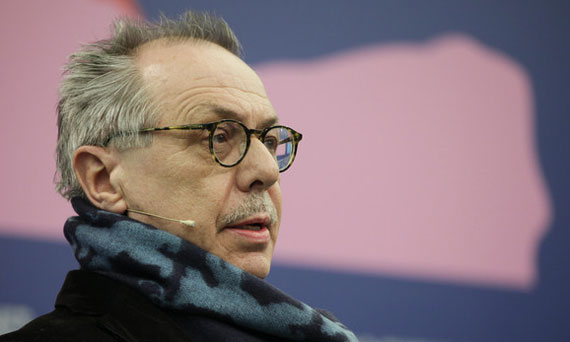Dieter Kosslick • Director of the Berlinale
Reality is always an issue
- Dieter Kosslick discusses the programme of the 64th Berlinale and the advantages of a new digital delivery system

Berlin International Film Festival director Dieter Kosslick tells Cineuropa about the programme of the festival's 64th edition and about the advantages of a new digital delivery system.
Cineuropa: With the opening film The Grand Budapest Hotel [+see also:
film review
trailer
making of
film profile] by Wes Anderson and George Clooney's The Monuments Men [+see also:
trailer
making of
film profile] in competition, not to mention Christophe Gans' Beauty and the Beast [+see also:
trailer
making of
interview: Christophe Gans
interview: Léa Seydoux
interview: Vincent Cassel
film profile], the Berlinale is showcasing three films from Babelsberg. What does the growing international importance of this location mean for the Berlinale?
Dieter Kosslick: There are many movies in our programme that have some German elements. The German films and co-productions in competition were supported by various film fund organizations, among them our World Cinema Fund with two competition entries.
All these elements show us at the Berlinale which kinds of films the various funding and production possibilities such as Babelsberg can lead to. But we should not forget about filming locations such as Munich, North Rhine-Westphalia, Hamburg, Ludwigsburg and the Mitteldeutsche Medienförderung, which also have a presence through several movies at our festival.
What do you think about the newcomers?
Half of the directors in the Berlinale competition are there for the first time – people such as Dietrich Brüggemann, Lou Ye, Feo Aladag, Celina Murga, Sudabeh Mortezai and Yannis Economides. The filmmaker Yann Demange is a former Berlinale Talent. Altogether at this year's festival, there are 62 films from former Berlinale Talents.
One filmmaker you have known for over 20 years is Lars von Trier. After his scandal at Cannes, he refuses to give statements to the press. Will he show up at the press conference?
That's up to him. I will be delighted if he comes to Berlin. We have had a close relationship as friends since 1987, when he presented his second feature film Epidemic at theEuropean Low Budget Film Forum in Hamburg. Later on, when I was the Executive Director of the Filmstiftung NRW, I supported Melancholia [+see also:
film review
trailer
interview: Lars von Trier
film profile] and Dancer in the Dark.
What kinds of themes are the filmmakers dealing with?
On one hand, they are looking back to the past, and on the other hand, they also deal with reality, which is always an issue at festivals. One theme is what happens to children in a tough environment. Religion and sex matter not only in Lars von Trier's Nymphomaniac [+see also:
film review
trailer
interview: Louise Vesth
film profile], but also in Stations of the Cross [+see also:
film review
trailer
Q&A: Dietrich Brüggemann
film profile] by Dietrich Brüggemann.
We are also showing the horror of National Socialism in various forms; from The Monuments Men to Diplomacy [+see also:
trailer
film profile] by Volker Schlöndorff. In the Forum we are screening the documentary German Concentration Camps Factual Survey about the liberation of the Bergen-Belsen concentration camp, which Hitchcock was supposed to edit. We are showing a reconstructed version that complied with his instructions. The making of Night Will Fall by André Singer can be seen in the Berlinale Special.
In the Panorama we are presenting the film The Decent One [+see also:
trailer
film profile] about the private life of the SS commmander Heinrich Himmler. If you look at these films, you realise there is a connection. Diplomacy takes place 24 hoursbefore The Monuments Men arrive in Paris. And in The Decent One we meet the private Himmler, who carried out a mass murderer.
For the first time, the 1,000-plus films that will be screened at the Berlinale and the EFM are being digitally stored in a data centre which is connected via fibre-optics to the cinemas. Is that a logistical advantage?
Absolutely, because now the films are getting directly transfered into the cinemas. In the transition period we had to solve not only technical but also financial problems because we had to equip almost 70 screens with server and projection systems. From now on, we won't have to bring the equipment and hard disks back and forth across the city. That is an important simplification measure for our film office – and a big technological step forward for the Berlinale.
Meanwhile, almost all the films are stored on DCP. Among the 400 festival films are barely 50 traditional 35mm prints that need to be brought physically to the cinemas, such as the 30 films for our retrospective. All the other films are coming directly from the data centre.
Did you enjoy reading this article? Please subscribe to our newsletter to receive more stories like this directly in your inbox.
















